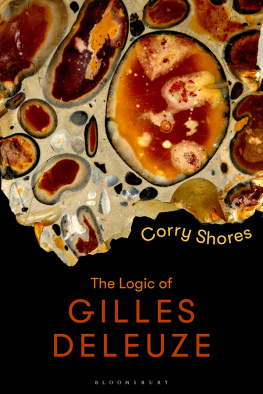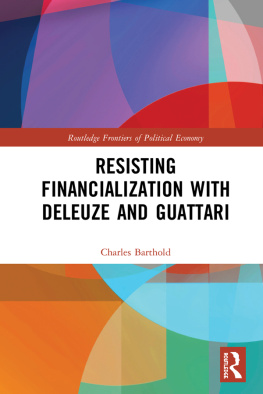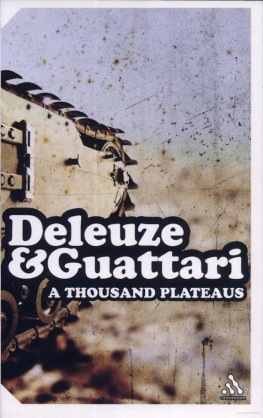Table of Contents
EUROPEAN PERSPECTIVES
A Series in Social Thought and Cultural Criticism
LAWRENCE D. KRITZMAN, EDITOR
European Perspectives presents outstanding books by leading European thinkers. With both classic and contemporary works, the series aims to shape the major intellectual controversies of our day and to facilitate the tasks of historical understanding.
For a complete list of books in the series, see pages 65355.
Acknowledgments
I would like to thank all those who generously contributed their time during the interviews that I carried out between 2004 and 2006. Their help was essential for making this biography possible: Alfred Adler, ric Alliez, Dudley Andrew, Bernard Andrieu, Manola Antonioli, Alain Aptekman, Olivier Apprill, Philippe Artires, Zafer Aracagk, Franois Aubral, Danile Auffray, Jacques Aumont, Kostas Axelos, Alain Beaulieu, Raymond Bellour, Thomas Bnatouil, Rda Bensmaa, Denis Berger, Giuseppe Bianco, Pierre Blanchaud, Pascal Bonitzer, Julian Bourg, Christian Bourgois, Constantin Boundas, Christine Buci-Glucksmann, Bernard Cache, Michel Cartry, Pascal Chabot, Pierre-Antoine Chardel, Nolle Chtelet, Jean Chesneaux, Michel Ciment, Pascale Criton, Andrew Cutrofello, Fanny Deleuze, Christian Descamps, Marc-Alain Descamps, Juacques Donzelot, Jean-Maris Doublet, Jean-Claude Dumoncel, lie During, Corinne Enaudeau, Jean-Pierre Faye, Pierrette Fleutieux, Franois Fourquet, Daniel Franco, Grard Fromanger, Maurice de Gandillac, Roger Gentis, Fernando Gonzales, Frdric Gros, Lawrence Grossberg, Bruno Guattari, Emmaneulle Guattari, Jean Guattari,Alain et Danile Guillerm, Nicole Gullet, Suzanne Hme de Lacotte, Eugene Holland, Michel Izard, Eleanor Kaufman, Lawrence Kritzman, Christina Kullberg, David Lapoujade, Claude Lemoine, Jean-Louis Leutrat, Sylvain Loiseau, Sylvre Lotringer, Yves Mabin, Norman Madarasz, Robert Maggiori, Jose Manenti, Jean-Paul Manganaro, Patrice Maniglier, Michel Mari, Jean-Clet Martin, Herv Maury, Philippe Mengue, Alain Mnil, Catherine Millot, Olivier Mongin, Pierre Montebello, Liane Mozre, Lion Murard, Jean-Pierre Muyard, Stphane Nadaud, Jean Narboni, Toni Negri, Miguel Norambuena, Jean Oury, Franois Pain, Dominique Pani, Jo Panaget, Thierry Paquot, Andr de Souza Parente, Giorgio Passerone, Paul Patton, Florence Ptry, Richard Pinhas, Rafal Pividal, Jean-Claude Polack, Matthieu Potte-Bonneville, Daniel Price, John Protevi, Olivier Querouil, Anne Querrien, David Rabouin, Jacques Rancire, Francois Regnault, Olivier Revault DAllonnes, Judith Revel, Alain Roger, Jacob Rogozinski, Suely Rolnik, lisabeth Roudinesco, Jean-Michel Salanskis, Elias Sanbar, Anne Sauvagnargues, Ren Schrer, Dominique Sglard, Guillaume Sibertin-Blanc, Danielle Sivadon, Grard Soulier, Hidenobu Suzuki, Jean-Baptiste Thierre, Simon Tormey, Serge Toubiana, Michel Tournier, Michel Tubiana, Guy Trastour, Kuniichi Uno, Janne Vehanen, Paul Veyne, Arnaud Villani, Tiziana Villani, J. MacGregor Wise, Frdric Worms, Chris Youns, Dork Zabunyan, and Franois Zourbachivili.
I would also like to thank Virgine Linhart profoundly for having very generously provided the interviews she conducted for her study of Felix Guattaris life with the following: ric Alliez, Raymond Bellour, Franco Berardi Bifo, Denis Berger, Jacky Berroyer, Novella Bonetti-Bassano, Jack Brire, Michel Butel, Michel Cartry, Gaby Cohn-Bendit, Marie Depuss, Gisle Donnard, Jean-Marie Doublet, Hlne Dupuy de Lme, Mony Elkam, Patrick Farbias, Jean-Pierre Faye, Franois Fourquet, Grard Fromanger, Gervaise Garnaud, Sacha Goldman, Bruno Guattari, Emmanuelle Guattari, Jean Guattari, Tatiana Kecojevic, Jean-Jacques Lebel, Sylvre Lotringer, Pierre Manart, Lucien Martin, Ramondo Matta, Ginette Michaud, Gian Marco Montesano, Yann Moulier-Boutang, Lion Murard, Toni Negri, Jean Oury, Pierre Pachet, Franois Pain, Jo Panaget, Jean-Claude Polack, Anne Querrien, Jacques Robin, Michel Rostain, Dominique Seglard, Grard Soulier, Isabelle Stengers, Massaki Sugimura, Paul Virilio, and Claude Vivien.
I would also like to thank my friend Jean-Christophe Goddard very much for having invited me to speak during the exciting two-day workshop on Anti-Oedipus that he organized at the University of Poitiers on December 23, 2005.
Thanks also to Anne Sauvagnargues and Guillaume Sibertin-Blanc for having allowed me to come to their seminar, Reading Deleuze and Guattaris A Thousand Plateaus, at the Working Group on Deleuze, Spinoza, and the Social Sciences at the Center for the Study of Rhetoric, Philosophy, and the History of Ideas (CERPHI) in 20052006.
My thanks also go to Emmanuelle Guattari, for her early support for this project, and to Jos Ruiz Funes, for having facilitated my access to the Guattari collection at the IMEC Archives.
Thanks also to Fanny Deleuze and Emmanuelle and Bruno Guattari for having spoken with me and for giving me permission to publish their personal photographs.
Finally, and with the deepest gratitude, I would like to thank my first readers, who helped me substantially improve the first draft. I obviously owe them a great debt for innumerable corrections, information, and suggestions: Manola Antoniolli, Raymond Bellour, Franois Fourquet, Hugues Jallon, Thierry Paquot, Guillaume Sibertin-Blanc, and Danielle Sivadon. And of course, my thanks to Florence Dosse, for having given up her own research so that I could benefit from her indispensable skills as a reader.
Introduction
Betwixt or Between
Four-handed. The work of Gilles Deleuze and Flix Guattari remains an enigma, even today. Who was the author? One or both of them? How could two such different men, with such distinct sensibilities and styles, pursue their intellectual agenda together for more than twenty years (19691991)? How could they have been so closeyet so distant that they used the formal vous to address each other (though both used the informal tu quite easily with others)? How do we describe the propulsive energy of this unique adventure? How did the collaboration between these two writers function? It is often difficult to determine what belongs to whom in their writing, but at the same time it would be somewhat of an exaggeration to suggest a hypothetical third person, since both writers maintained their own identity and went in distinctly different directions, even as they collaborated on a common enterprise.
In 1968, Gilles Deleuze and Flix Guattari inhabited very different worlds, and there was little chance that they would ever meet. Deleuze was a recognized philosopher who had by then already published a large body of work; Guattari was a militant psychoanalyst, the director of a psychiatric clinic, the author of several articles, and a social scientist. While we might agree with Robert Maggiori that they were destined to meet, there was no historical necessity in the meeting. How their two worlds came into contact with each other remains an open question. As we shall see, the tremendous intensity of May 1968 made such an unlikely encounter possible. More prosaically, we know that Dr. Jean-Pierre Muyard, who was practicing at La Borde, was the mercurial and important middleman who brought the two together. Flix Guattari dedicated Anti-Oedipus, the first joint publication of the two authors: To Jean-Pierre, the true culprit, the leader, the initiator of this perverse undertaking.
In the late 1950s, Jean-Pierre Muyard was a medical student in Lyon and a militant member of the left wing of the National French Students Union (UNEF), which vigorously protested the war in Algeria. He became president of the Lyon section of the UNEF in 1960 and that same year met Jean-Claude Polack, the president of the General Association of Parisian Medical Students. Muyard was specializing in psychiatry but was also taking sociology courses at the Lyon University Humanities Division, and he was particularly interested in the courses given by the philosopher Henri Maldiney. In 1965, Muyard became vice president of the National French Students Mutuelle (MNEF) and got involved in creating an office to provide psychological counseling to university students (BAPU). He first met Guattari during a seminar organized by the Left Opposition in 1964 in Poissy, to which Jean-Claude Polack had invited him. Muyard recalls:














